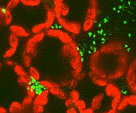Plant Pathology, Department of

Department of Plant Pathology: Faculty Publications
Document Type
Article
Date of this Version
4-2013
Citation
Phytopathologia Mediterranea 52:1 (2013), pp. 123−129.
doi: 10.14601/Phytopathol_Mediterr-11244
Abstract
Tejocote (Crataegus mexicana), a small pome crab-apple-like fruit, is becoming economically important in California with increasing production, so consideration of diseases that hinder the yield is important. Diseased trees of tejocote were observed in four orchards of Riverside and San Diego Counties of California. Ten symptomatic/asymptomatic samples were studied from each of the orchards. Five most frequently isolated fungi were identified on the basis of morphological characters and sequence data of the internal transcribed spacer ITS1-5.8SITS2 and partial β-tubulin gene. Three isolates were identified as Neofusicoccum luteum and two as Phomopsis sp. Pathogenicity tests were conducted by inoculating detached shoots of healthy tejocote trees. Significant lesions were observed on all shoots inoculated with the three N. luteum isolates (designated UCR1190, UCR1191, and UCR1192), but not on the shoots inoculated with other isolates or the non-inoculated controls. Results indicated that all three N. luteum isolates are aggressive pathogens on tejocote. This pathosystem should be further studied with a goal of designing appropriate disease management strategies.


Comments
Copyright © 2013 Firenze University Press.
This work is licensed under a Creative Commons Attribution 4.0 International License (CC-BY- 4.0).